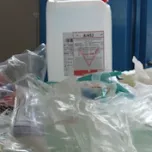There has been discussion in the Green Nephrology Forum about recycling of bicarbonate containers on the dialysis unit.
Clearly a fair number (I am not sure exactly how many) of units are now recycling these, but some others who would like to introduce recycling have been looking for reassurance with regard to health and safety - handling/disposal of the excess bicarbonate, and infection control. Ideally, they would like to be able to refer to official guidance where available.
I've been making some enquiries and thought I would post a brief summary of what i have managed to find out so far.
Disposal of Excess Bicarbonate
1. Department for Health guidance on safe management of healthcare wastes
Paragraph 8307 (p174 in Version 1) on glass / plastic medicinal containers says:
"Waste medicines should not be discharged to foul sewer, so contaminated containers or their contents should not be rinsed out. Contaminated bottles, vials and ampoules should be disposed of as waste medicines.
"Non-pharmaceutically-active medicines are the exception. Liquids (including sugar and salt solutions), sterile water, and nutritional supplements can be disposed of to foul sewer; if there is any doubt, advice from the sewerage undertaker should be sought. The containers can be rinsed and recycled."
2. Product information
The Material Safety Data Sheet for sodium bicarbonate used in dialysis states that it there are no significant health effects (acute or chronic) - see for example MSDS
3. Water UK National Guidance for Healthcare Waste Water Discharges
p20 on Renal Dialysis states that "Normal waste arising from the dialysis process and post dialysis washings can be disposed of to foul sewer"
I contacted Dave Wiltshire of Water UK (Senior Consultant - Trade Effluent Quality and Compliance at Thames Water Utilities Ltd) for clarification regarding disposal of bicarbonate sludge.
He has advised (by email, 24.4.2012) that "excess bicarbonate should be dissolved and may be discharged to sewer with copious amounts of water to ensure that internal drains are not blocked" and is happy to be quoted on this.
Infection control
I have not been able to locate any official guidance covering specific infection risk from containers connected upstream of the dialysis circuit. Unless there is backwash of blood (which should not occur under normal circumstances, but would be visible), then the main risk would be incidental contamination via a blood splash.
Mary Thomson, Green Nephrology Local Representative in NHS Fife, says:
"In our unit if there is a droplet of blood on any of the containers we simply wipe it with a detergent wipe and send it for recycling. If it is covered with blood, we put it in clinical waste - it is purely common sense. I have never come across any guidance on this topic, however, I adopt the principles contained in the HSE's 5 steps to risk assessment. […] As our patients in the dialysis area are screened 3 monthly for Hep B/C/HIV and MRSA/MSSA we know whose blood is infectious and proper precautions are used for those patients.
"With regards to the second question of recycling in the clinical area, again, sorry, no formal risk assessment, however infection control and estates were involved in developing the system when we introduced it. We have also had our recycling systems viewed by HEI and no concerns were raised - this supports my view we are doing as much as possible to reduce the risks of infection."
I have sought advice from Lorraine Holme, Policy and Programme Management (Sustainable Development), Department of Health Estates & Facilities Division, and from Dr Terry Tudor, Lecturer in Waste Management, University of Northampton, but neither has been able to direct me to any specific guidance on this point, although i am awaiting a further response from another contact at DH.
If anyone else has information which they could share, please do!

Please log in or sign up to comment.